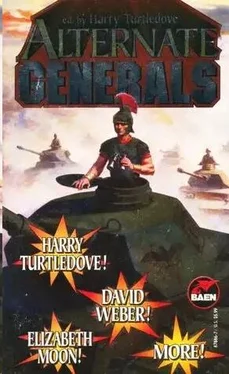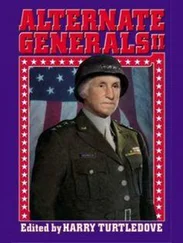Harry Turtledove - Alternate Generals
Здесь есть возможность читать онлайн «Harry Turtledove - Alternate Generals» весь текст электронной книги совершенно бесплатно (целиком полную версию без сокращений). В некоторых случаях можно слушать аудио, скачать через торрент в формате fb2 и присутствует краткое содержание. Год выпуска: 2000, ISBN: 2000, Издательство: Baen, Жанр: Альтернативная история, на английском языке. Описание произведения, (предисловие) а так же отзывы посетителей доступны на портале библиотеки ЛибКат.
- Название:Alternate Generals
- Автор:
- Издательство:Baen
- Жанр:
- Год:2000
- ISBN:0-671-87886-7
- Рейтинг книги:3 / 5. Голосов: 1
-
Избранное:Добавить в избранное
- Отзывы:
-
Ваша оценка:
- 60
- 1
- 2
- 3
- 4
- 5
Alternate Generals: краткое содержание, описание и аннотация
Предлагаем к чтению аннотацию, описание, краткое содержание или предисловие (зависит от того, что написал сам автор книги «Alternate Generals»). Если вы не нашли необходимую информацию о книге — напишите в комментариях, мы постараемся отыскать её.
Alternate Generals — читать онлайн бесплатно полную книгу (весь текст) целиком
Ниже представлен текст книги, разбитый по страницам. Система сохранения места последней прочитанной страницы, позволяет с удобством читать онлайн бесплатно книгу «Alternate Generals», без необходимости каждый раз заново искать на чём Вы остановились. Поставьте закладку, и сможете в любой момент перейти на страницу, на которой закончили чтение.
Интервал:
Закладка:
Overwhelmed by detail as any commander would be after such a victory, he barely asked who I was, and paid no attention to Maeve.
I’d wondered many times that spring if I’d ever see Roma again. Returning was like walking from a dream.
But it was no dream, for Maeve was with me, first as my ward, then as my wife. It was a year before she smiled again, but smile she did. As did I. More than once over the years I’ve stood on the Gaulish shore and glimpsed the white cliffs of Dubris, but I’ve never again set foot on the island itself. In Maeve’s eyes, though, I see every day the clear lapis sides of Britannia.
Ave atque vale.
The old man laid down his pen. His gut cramped and a cold sweat trickled down his face. The gods had waited long years before taking him as they had taken Boudica, with a bellyful of poison.
His family’s delight at his return had become displeasure when he told them his ambition was burned to ashes.
But his knowledge of Britannia and the trading of gold made him a successful merchant, so that he sacrificed to Mercury as often as to Mars and Mithras. For truth didn’t run in straight lines, but made spirals, and braids, and intricate golden embroideries.
“Good evening. Father,” said his son from the doorway.
Marcus looked up.
“We’ve a few moments before the guests arrive. Sit beside me, Artorius, and let me tell you once again that while I was a disappointment to my father, you are not to me.”
“How could I disappoint you, when you’ve taught me so much?” Artorius’s even-tempered smile was his mother’s, and yet his grandmother’s humor, bright and sharp as a golden sickle, lurked at the corners of his mouth. At one and thirty he was in the prime of life, a tall, clean limbed man with a glint of red in his brown hair. He’d already served as quaestor and curator in Dacia and Macedonia. Now he was going to the province of Britannia as procurator. Which, Marcus thought, seemed only fair.
Maeve walked into the room and handed Marcus the tore.
“Here it is.”
It was almost too heavy for him. He would’ve dropped it if Artorius’s strong hands hadn’t caught it. Marcus passed it gladly to his son.
“I know now why I carried this through fire and blood. For you to throw into the Tamesis, in the name of the goddess Andrasta and of peace.”
“As you wish,” Artorius said, his doubt tempered with respect.
Marcus handed him the scroll, too.
“And this is for you to read on your journey north. To remind you that every truth and every duty has many different braided strands. To remind you of Seneca’s aphorism: Fire is the test of gold, adversity, of strong men.”
“In your veins runs the blood of both Roma and Britannia,” Maeve told him.
“May you found a new race.
May your name and the names of your descendants be long remembered, in Britannia and beyond its borders.”
The gleam of the tore was reflected in Artorius’s indigo blue eyes.
“I’ll bring honor to my name and my blood, I swear it.”
Marcus smiled through his pain, content.
Tradition
Elizabeth Moon
July 31, 1914. Durazzo, Albania
Rear Admiral Sir Christopher George Francis Maurice Cradock strode briskly along the deck of his flagship, H.M.S. Defence, walking on the effects of last night’s dinner with the officers of the S.M.S. Breslau. Despite the political tension of the past few weeks, it had been a pleasant evening of good food and good talk, punctuated by the clink of silver on china and the gurgle of wine into glasses as the mess stewards kept them filled.
Only once had Commander Kettner revealed any hint of that German confidence which so nearly approached arrogance.
“You English—” he had said, his voice rising.
Then he had chuckled affably.
“You have so much invested in tradition,” he had continued, more relaxed.
“We Germans have a tradition to make. It is always so for vigorous youth, is it not?” The clear implication that the Royal Navy was superannuated had rankled, but Cradock had passed it off graciously. Time enough to compare traditions when the young eagle actually flew and dared its talons against Britannia’s experience. He had no doubt that rashness would be well reproved.
Cradock took a deep breath and eyed the steep tile roofs, bright in morning sunlight, that stepped down to
the harbor, its still water perfectly reflecting both ships and buildings. Behind them rose the mountains in which-in happier years—he had hunted boar. No fox hunting here, but a sportsman could find some game anywhere.
He glanced over at Breslau, admitting to himself that the Germans had certainly reached a high standard of seamanship. Every detail he had seen the day before had been correct. Several of the officers had read his books; they had asked him to expand on some of the points he’d made. Only courtesy, of course, but he could not help being pleased.
A thicker ooze of smoke from Breslau’s funnels stained the morning air. Cradock slowed. On her decks a subdued flurry of movement he recognized at once. Astern, the smooth reflection of the mountains shattered like a dropped mirror as her screws churned. He turned to his flag lieutenant.
“What do we know of Admiral Souchon and the Goeben?” Cradock asked.
“At last report, sir, the Goeben had made port in Trieste, then gone to sea for gunnery practice.”
A cold chill ran down Cradock’s back. Gunnery practice? If the Germans were intending to declare war first, only they would know when. The Japanese had given no warning to the Russians at Port Arthur in 1904.
“When Breslau weighs anchor, send word to Admiral Milne,” Cradock said.
“And inform Captain Wray that we will be returning to Corfu immediately.”
“Sir.”
In short order, the German light cruiser was moving out of the anchorage, a demure curl of white at her bow that would, Cradock was sure, lengthen to a streak when she was out of sight.
August 6, 1914. Early morning off Corfu
Admiral Cradock considered, as he took several rashers of bacon onto his plate, at what point his duty to His Majesty might require disobedience to his superior, Admiral Sir Berkeley Milne. It was not a dilemma in which he had ever expected to find himself.
When he raised his flag in H. MS. Defence, a British admiral in command of a cruiser squadron in the Mediterranean could expect a constant round of visits to attractive ports, dinners with dignitaries who all wanted some concession, meetings with other naval officials, all conducted with the utmost ceremony. Here were the smartest ships in the Royal Navy, and the most favored officers.
Now he commanded a squadron at war, a situation calling for very different talents than the ability to dance with a prime minister’s daughter or make polite conversation with French magistrates and Turkish pashas. And—more to the point—a situation in which mistakes would imperil not merely an officer’s reputation and future career, but the very survival of the Empire.
Cradock knew himself to be an old-fashioned sailor.
Seamanship was his passion, correct and accurate handling of ships in all weathers, placing them where they could best effect strategy. Seamanship required comprehensive knowledge of exact details: how to organize coaling, how to coil ropes, how to turn a ship in formation precisely where she should turn. Most important, it required naval discipline, on which both naval tradition and the whole towering edifice of empire depended. Lack of discipline led to slovenly seamanship, and that, in the end, to disaster.
His responsibility, therefore, was to do what his commander told him. Therein lay the rub.
Admiral Sir Berkeley Milne, Commander in Chief of the Mediterranean Fleet, had in the past few days revealed himself no Nelson. For three days, Milne had thrashed around the Mediterranean in vain pursuit of the German ships, shifting Cradocks own squadron about in useless dashes, a waste of coal and energy. Now, on the second full day of war, when the German ships were in Messina and could have been bottled up by placing adequate force at either end of the Strait of Messina, Milne had instead taken his battle cruisers off to coal in Bizerte—all the way to North Africa. He had ordered Cradock to stay at the mouth of the Adriatic, and placed only little Gloucester to watch the exit to the eastern Mediterranean, because he was sure the Germans would try to go west.
Читать дальшеИнтервал:
Закладка:
Похожие книги на «Alternate Generals»
Представляем Вашему вниманию похожие книги на «Alternate Generals» списком для выбора. Мы отобрали схожую по названию и смыслу литературу в надежде предоставить читателям больше вариантов отыскать новые, интересные, ещё непрочитанные произведения.
Обсуждение, отзывы о книге «Alternate Generals» и просто собственные мнения читателей. Оставьте ваши комментарии, напишите, что Вы думаете о произведении, его смысле или главных героях. Укажите что конкретно понравилось, а что нет, и почему Вы так считаете.












